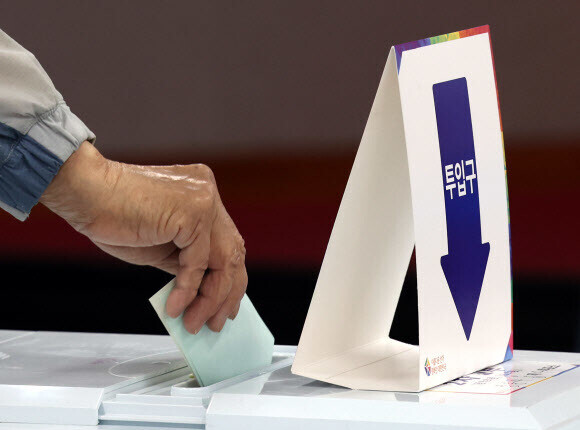hankyoreh
Links to other country sites 다른 나라 사이트 링크
Voting gender gap widens further in S. Korea’s latest elections

The voting formula that Korean men in their 20s vote for the conservatives and Korean women in their 20s vote for the liberals held true once again in the local elections on Wednesday.
When the results of exit polls jointly carried out on June 1 by Korea’s three terrestrial broadcasters (KBS, MBC and SBS) are broken down by age, they show that 65.1% of men aged 18-29 voted for candidates in the conservative People Power Party (PPP). In contrast, 66.8% of women aged 18-29 supported candidates in the liberal Democratic Party.
A similar trend was observed among voters in their 30s, with 58.2% of men in that age group supporting the PPP and 56% of women supporting the Democratic Party.
In specific elections, more than 7 out of 10 men in their 18-29 (75.1%) cast ballots for Oh Se-hoon, while a little less than 7 out of 10 women in the same age group supported Democratic Party candidate Song Young-gil (67%).
In the Gyeonggi Province gubernatorial race, 66.3% of men in their 20s and below said they voted for PPP candidate Kim Eun-hye, while 66.4% of women in that cohort voted for Democratic Party candidate Kim Dong-yeon.
The gender split between voters in their 20s was even more pronounced than in the presidential election in March. Exit polls during that election showed that 58.7% of men in their 20s supported PPP candidate Yoon Suk-yeol, while Democratic Party candidate Lee Jae-myung received the support of 58% of women in the same age group.
“Yoon’s pledge to dismantle the Ministry of Gender Equality and Family during the presidential campaign was a symbolic incident that led to a definite split in supporters along gender lines. That split was wider in the local elections than in the presidential election because turnout was lower and more enthusiastic supporters came out to the polls,” said Lee Kang-yun, director of the Korea Society Opinion Institute, in a phone call with the Hankyoreh.
By Seo Young-ji, staff reporter
Please direct questions or comments to [english@hani.co.kr]

Editorial・opinion
![[Guest essay] The real reason Korea’s new right wants to dub Rhee a founding father [Guest essay] The real reason Korea’s new right wants to dub Rhee a founding father](https://flexible.img.hani.co.kr/flexible/normal/500/300/imgdb/original/2024/0423/8317138574257878.jpg) [Guest essay] The real reason Korea’s new right wants to dub Rhee a founding father
[Guest essay] The real reason Korea’s new right wants to dub Rhee a founding father![[Column] ‘Choson’: Is it time we start referring to N. Korea in its own terms? [Column] ‘Choson’: Is it time we start referring to N. Korea in its own terms?](https://flexible.img.hani.co.kr/flexible/normal/500/300/imgdb/original/2024/0423/3617138579390322.jpg) [Column] ‘Choson’: Is it time we start referring to N. Korea in its own terms?
[Column] ‘Choson’: Is it time we start referring to N. Korea in its own terms?- [Editorial] Japan’s rewriting of history with Korea has gone too far
- [Column] The president’s questionable capacity for dialogue
- [Column] Are chaebol firms just pizza pies for families to divvy up as they please?
- [Column] Has Korea, too, crossed the Rubicon on China?
- [Correspondent’s column] In Japan’s alliance with US, echoes of its past alliances with UK
- [Editorial] Does Yoon think the Korean public is wrong?
- [Editorial] As it bolsters its alliance with US, Japan must be accountable for past
- [Guest essay] Amending the Constitution is Yoon’s key to leaving office in public’s good graces
Most viewed articles
- 1[Column] ‘Choson’: Is it time we start referring to N. Korea in its own terms?
- 2Why Korea shouldn’t welcome Japan’s newly beefed up defense cooperation with US
- 3Senior doctors cut hours, prepare to resign as government refuses to scrap medical reform plan
- 4[Guest essay] The real reason Korea’s new right wants to dub Rhee a founding father
- 5[Column] The clock is ticking for Korea’s first lady
- 6Opposition calls Yoon’s chief of staff appointment a ‘slap in the face’
- 7Terry Anderson, AP reporter who informed world of massacre in Gwangju, dies at 76
- 8New AI-based translation tools make their way into everyday life in Korea
- 9Samsung barricades office as unionized workers strike for better conditions
- 10Korean government’s compromise plan for medical reform swiftly rejected by doctors